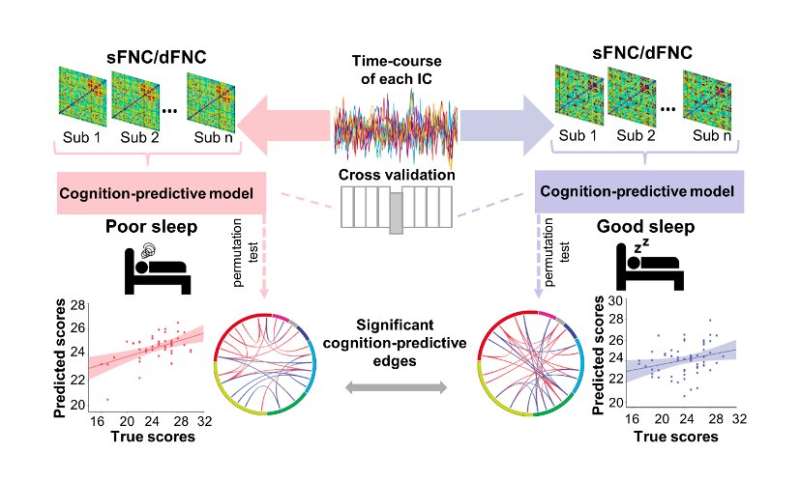December 7, 2021 feature
The possible effects of sleep quality on cognitive function in healthy older adults

In humans, aging is often associated with changes in sleeping patterns, cognitive abilities and functional network connectivity (i.e., the strength with which activity in different brain regions correlates over time). While many neuroscientists investigated these changes over the past decades, the relationship between them is still poorly understood.
Researchers at Southwest University in China have recently carried out a study exploring the possible effects of sleep on the relationship between functional network connectivity (FNC) and cognitive function in the elderly. Their paper, published in Elsevier's Neuroscience journal, shows that, in older adults, sleep quality could modulate the association between FNC and cognitive function.
"Previous studies have showed that resting-state brain functional connectivity can predict the cognitive function of older adults," Jing Yu, one of the researchers who carried out the study, told Medical Xpress. "We were interested in whether this prediction could be moderated by older adults' sleep―a correlate disrupted with aging, while contributing to the change of cognitive function."
Yu and her colleagues recruited 107 healthy older adults and asked them to complete a questionnaire assessing their sleep quality. This questionnaire was based on the Pittsburgh Sleep Quality Index (PSQI), which examines seven aspects of sleep, including: sleep quality, sleep latency, sleep duration, habitual sleep efficiency, sleep disturbances, use of sleeping medication and daytime dysfunction.
Based on their questionnaire results, participants were divided into two groups, one containing people who reported sleeping well and the other participants who slept poorly. Subsequently, the researchers derived the participants' FNC and their cognitive function, using a series of different tools and techniques.
"Older adults completed the PSQI questionnaire that assessed their sleep quality over the past month and their brain functional magnetic resonance imaging (fMRI) was obtained," Yu explained. "The static and dynamic FNC was computed based on the imaging data. Then, the static and dynamic FNC were used to predict older adults' cognitive function to investigate whether sleep quality will modulate the relationship between FNC (i.e., static and dynamic FNC) and cognition function."
Overall, the researchers found that the participants' dynamic FNC (dFNC) could predict their cognitive function, thus the two measurements were related. Moreover, sleep quality appeared to modulate this association.
"Our findings show that sleep quality can modulate the relationship between dynamic FNC and cognitive function at both the micro level by edges (dFNC-var) and macro level by states (dFNC-state)," Yu said. "This suggests that sleep not only impacts older adults' cognitive function and FNC but also the association between the two correlates."
In the future, the findings collected by this team of researchers could have important implications for neuroscience research focusing on aging and age-related disorders. For instance, it could inform the development of treatment strategies and interventions for older adults with cognitive impairments, ranging from mild to severe impairments or Alzheimer's disease, which might set improving sleep quality as a key goal.
"In the future, we plan to use electroencephalogram and functional magnetic resonance imaging synchronous technology to simultaneously obtain more objective monitoring indicators of sleep quality and brain imaging data for older adults to more precisely explore the changes of sleep quality in older adults how modulating the relationship between the brain neural activity and cognition function," Yu said.
More information: Hong-Zhou Xu et al, Sleep Quality Modulates the Association between Dynamic Functional Network Connectivity and Cognitive Function in Healthy Older Adults, Neuroscience (2021). DOI: 10.1016/j.neuroscience.2021.11.018
© 2021 Science X Network





















